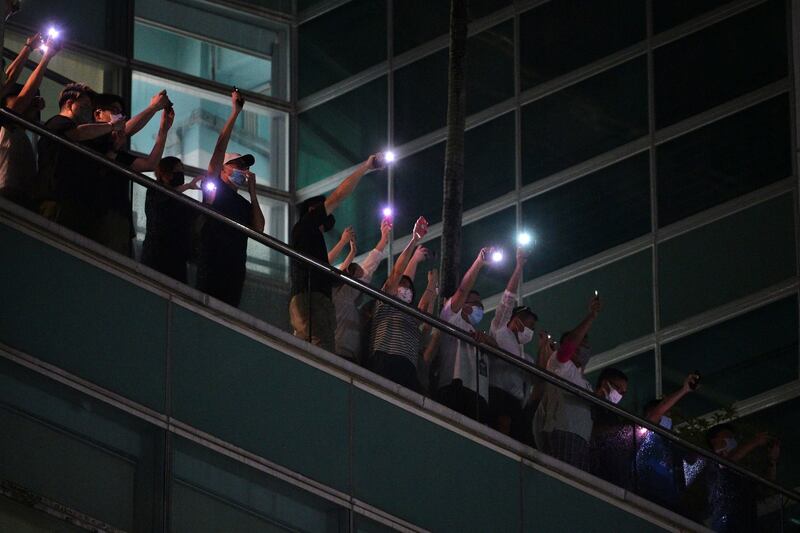Thousands of Hongkongers lined up from the early hours of Thursday morning to buy the last ever print copy of the pro-democracy Apple Daily newspaper, after the paper was forced to close after running afoul of the city's draconian national security law.
The print run for the paper's final edition ran to a million copies, with local residents forming long lines at news kiosks and convenience stores across the city.
"Painful partings in the rain," ran the banner headline, with a photo of supporters gathered outside the paper's headquarters late on Wednesday, emblazoned with a quotation that read simply: "We support Apple."
Staff and supporters lit up their phone flashlights and waved to each other through the evening, with dozens of vehicles lining the street outside the paper's headquarters in Tseung Kwan O.
An article posted to the paper's website on Wednesday titled "Apple's final chapter after 26 years of fighting the good fight" looked back at the paper's inception, just two years before Hong Kong's handover to Chinese rule on July 1, 1997.
"Please believe that all is darkest before dawn," the article said.
Journalists' unions spoke out against the latest "government blow to the freedom of the press" in Hong Kong, which saw the Apple Daily and its parent company Next Media forced to shut down operations after national security police froze H.K.$18 million in assets.
"In face of continuous government oppression, the 26-year-old media organization ceased operation today," the Hong Kong Journalists' Association (HKJA) said in a joint statement with other media unions on Thursday.
"The HKJA expresses anger and pain for the loss of this much valued multi-media press group that had long been pursuing and defending journalism," it said.

The unions, which included the Next Media union and the RTHK Programme Staff Union, called on members to wear black in protest at a government attack on press freedom.
"We cannot take to the streets to express our dissatisfaction as we are bound by the group gathering ban [due to COVID-19], but it won’t keep us silent," the statement said.
The closure of the Apple Daily came after an op-ed writer widely known by his penname Li Ping, was arrested by national security police on Wednesday on suspicion of "collusion with a foreign power," under a draconian national security law imposed by the ruling Chinese Communist Party (CCP) on Hong Kong from July 1, 2020.
National security police had earlier descended on the headquarters of Next Digital in Tseung Kwan O on June 17, confiscating computers and journalistic materials police said was "evidence" of collusion with foreign forces under the national security law, and arresting five of its executives.
Chief editor Ryan Law and Next Digital CEO Cheung Kim-hung have since been charged with "collusion with foreign powers," while three other executives have been released on bail without being charged.
Meanwhile, the company's landlord, the Hong Kong Science and Technology Park Corp., has served notice for Next Digital to quit their premises.
A notice on the former Apple Daily website said: "We are sad to inform you that Apple Daily and Next Magazine's web and app content will no longer be accessible at 23:59, 23 June 2021, HKT."
"Good luck, and goodbye," the message said.
A foreign ministry spokesman in Beijing warned that no media organization would be allowed to "endanger national security" in the name of press freedom.
"The authority of the National Security Law can't be challenged," the spokesman said, calling on critics in U.S. and other "Western" nations to stop interfering in China's internal affairs.
Reported by Malik Wang, Carmen Wu, Chan Yun Nam and Qiao Long for RFA's Cantonese and Mandarin Services. Translated and edited by Luisetta Mudie.
